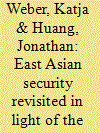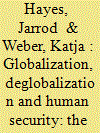|
|
|
Sort Order |
|
|
|
Items / Page
|
|
|
|
|
|
|
| Srl | Item |
| 1 |
ID:
097028


|
|
|
|
|
| Publication |
2010.
|
| Summary/Abstract |
This paper analyzes the relevance of the European integration experience for East Asia's future security architecture. Similar towhat happened in Europe, the paper argues, there may be a need for a cathartic process of remembrance and reconciliation in East Asia to help transcend historical legacies and create a solid foundation for integration. Considering the multi-faceted nature of security threats, moreover, it is hypothesized that the main ingredient of the European success strategy- the institutionalization of trust on multiple levels which, at least in some issue areas, requires the voluntary curtailment of states' autonomy- is likely to be emulated in the long run. A mini case study scrutinizes the essential elements of reconciliation (remembrance, restitution, apology) and shows how they enabled Germany to confront its past successfully, whereas Japanese attempts to transcend historical legacies thus far have fallen short. The paper then sketches several European institutional arrangements since the end of WorldWar II and, comparing them to East Asian security structures, speculates about future security provisions in East Asia.
|
|
|
|
|
|
|
|
|
|
|
|
|
|
|
|
| 2 |
ID:
180372


|
|
|
|
|
| Summary/Abstract |
Increased nationalism, greater protectionism and a gradual move away from a rules-based international order by some members of the international community do not bode well for vulnerable populations around the globe. Human security is threatened by a host of non-traditional security challenges catalysed by the growth of physical technologies and require multifaceted responses from a variety of actors. Many of those actors look to transnational networks built on globalized liberal order's social norms—what we call social technologies—for protection. The dwindling interconnectedness of deglobalization is likely to further empower corrupt governments at the expense of vulnerable citizens. This results from a decreased willingness by states and international institutions to defend human security. Whether one looks at the plight of persecuted citizens during Burma's military junta, human slaves in the fisheries off the coast of Indonesia, or farmers uprooted from their land by palm oil plantations, without social technologies to counterbalance the negative implications of physical technology the international community will lack the political capacity (sanctions, arms embargoes, travel restrictions, etc.), to aid those most in need. Ultimately, the effects of deglobalization on human security will depend largely on the trajectory of social technology developing alongside advances in physical technology.
|
|
|
|
|
|
|
|
|
|
|
|
|
|
|
|
|
|
|
|
|